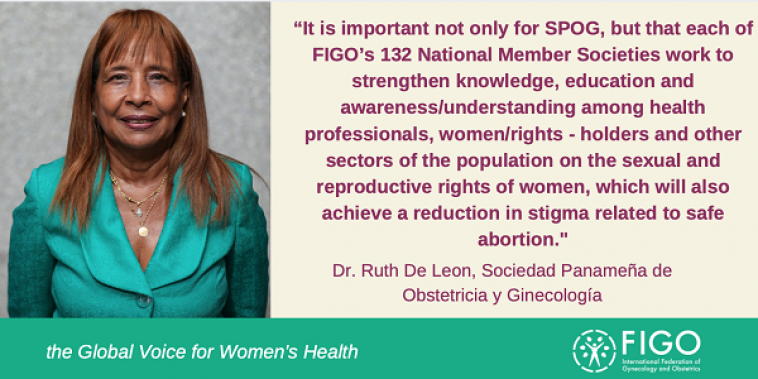Impact of COVID-19 on Unsafe Abortion

Dr Ruth De Leon, Sociedad Panameña de Obstetricia y Ginecología (SPOG) shares how the COVID-19 pandemic is resulting in higher levels of unintended pregnancies in Panama, and as a result places a woman at a greater risk to unsafe abortion and maternal death.
The Panamanian government implemented preventative measures in January 2020, to ensure that access to and the supply of health care remained strong in order to manage COVID-19. Such measures included suspending elective surgeries, visits and external consultations both in the public and private spheres to free-up slots, in addition to suspending vacations for health workers in the public sector as well as making more beds and resources available within the public and private health sector.
Four days after the first case was confirmed in Panama, on March 13, 2020, a curfew occurred, which started out being flexible, of only 8 hours (from 9:00 pm to 5:00 am), but since then there has been a 24-hour curfew.
Today, Panama lives in a total and compulsory quarantine (Panama’s cases and deaths continue to rise), that only allows maximum circulation: two hours a day for three days a week, according to gender and the last number of the personal identity document. Monday, Wednesday and Friday women can mobilise; while Tuesday, Thursday and Saturday, men. Due to the continuous increase in cases and the non-compliance of the population with the restriction rules, since June the absolute curfew was extended, which was previously only for Sunday, and was seen for a period between Saturday at 5: 00 pm and Monday at 5:00 am.
Impact of COVID-19 on comprehensive safe abortion
Even prior to COVID-19 access to safe abortion has been restrictive; abortion provisions are set in the Penal Code and abortion is considered illegal unless a woman’s life is at risk, or that of the fetus, or if the pregnancy is as a result of rape (up to 8 week only). The Penal Code sets that abortion is a crime (Articles 141 – 143) with a sentence of imprisonment of up to three years for the woman who has an abortion and up to eight years for anyone assists her.
FIGO believes that access to safe abortion is essential time-sensitive health care – as recognised by World Health Organisation. During the COVID-19 pandemic, women’s access to safe abortion may be further compromised due to the impact of the quarantine.
It is important that women can continue to exercise their right to a comprehensive safe abortion (as set in the law). It is essential that the necessary legal process to verify and certify a case of sexual violence and the approval of therapeutic abortion cases, by the Ministry of Health’s national committee of abortion, are not disrupted which may result in delays and complications for women.
The Ministry of Health (Minsa) has guaranteed that previously established processes to access legal and safe abortion will continue and will not be affected by measures put in place to manage COVID-19, this also includes relevant resources to carry out the medical procedures required for safe abortion cases, such as the manual vacuum aspiration (AMEU). Guaranteeing these rights and resources is essential to ensuring that women can continue to access safe and legal abortion during the COVID-19 pandemic, and they are critical to preventing maternal mortality in Panama.
Due to the COVID-19 pandemic, SPOG is concerned about the increase in cases of domestic and sexual violence against women, which results in an increase in unplanned and unwanted pregnancies. If victims/survivors of domestic violence and sexual violence cannot access abortion care services, and/or established legal processes to access a safe abortion, many women will resort to unsafe abortions, which then exponentially puts them at risk to a maternal death.
In Panama, the majority of women are at risk of unsafe abortion, because of the stigma attached to abortion. A lack of awareness and full understanding of the legal aspects and rights related to safe abortion services – both by the women, and in some cases health workers and other actors such as lawyers, social workers, community leaders poses further barriers. Adolescent women, women who live in poverty, women with low literacy rates, women little or no access to sexual and reproductive education, and women who have a lack of access and understanding on methods contraceptives and quality health care are at in the highest risk group for unsafe abortions and maternal mortality.
SPOG’s work
SPOG, with the support of FIGO, is working on an Advocating for Safe abortion project that seeks to reduce maternal mortality rates caused by unsafe abortions. It is important not only for SPOG, but that each of FIGO’s 132 National Member Societies work, to strengthen knowledge, education and awareness/understanding among health professionals, women/rights -holders and other sectors of the population on the sexual and reproductive rights of women, which will also achieve a reduction in stigma related to safe abortion.
Recently, through its digital platforms and in partnership with local media, SPOG has released communications that provide information aimed at highlighting the links between COVID-19, and an increase in domestic and sexual violence leading to unwanted pregnancies and unsafe abortions. At the same time SPOG continues to provide information to women and health professionals on the on the grounds that would allow legal access to safe abortion services, and why safe abortions are critical to reducing maternal deaths of women in Panama.